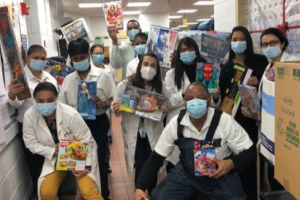January is National Birth Defects Prevention Month. It is a time for raising awareness of how frequently birth defects can occur and what can be done to help prevent them.
Birth defects are defined as conditions that are present when a baby is born and can affect nearly every part of the body. Conditions such as cleft lip can be easily diagnosed. Other conditions such as deafness or heart defects may only be discovered after diagnostic testing.
The largest number of birth defects occurs during the first three months of gestation. In the U.S. approximately 120,000 babies are born with birth defects each year.
The 10 most common birth defects in the US, according to the Centers for Disease Control and Prevention (CDC) are:
- Down syndrome
- Cleft lip (with or without cleft palate)
- Atrioventricular septal defect (hole in the heart)
- Absence of malformation of the rectum and/or large intestine
- Gastroschisis (hole in the abdominal wall)
- Tetralogy of Fallot (a combination of heart defects)
- Spina bifida without anencephaly
- Reduction deformity, upper limbs
- Reversal of the heart’s two main arteries
Although birth defects can’t always be prevented, there are plenty of steps pregnant women can take to help reduce the risk.
The womenshealth.gov website offers these suggestions:
- Make regular visits to your doctor throughout pregnancy
- Get 400mcg of folic acid each day through diet or supplements
- Don’t smoke, use illegal drugs or drink alcohol while you are pregnant
- Always check with your doctor before taking any medication
- Get all vaccinations recommended by your doctor
- If you have diabetes, keep it under control
- Stick to a healthy weight
You may also request a pre-pregnancy or early pregnancy screening test in order to spot potential or real birth defects. The types of tests include a carrier test to see if you or your partner carries potentially harmful genes, as well as screening and diagnostic tests that can determine risks for and detect genetic disorders.
If you are pregnant, or planning to be, and want to discuss your options with one of our doctors, the Women’s Health Center at Flushing Hospital Medical Center is centrally located and has convenient hours; to make an appointment call 718-670-8992.
All content of this newsletter is intended for general information purposes only and is not intended or implied to be a substitute for professional medical advice, diagnosis or treatment. Please consult a medical professional before adopting any of the suggestions on this page. You must never disregard professional medical advice or delay seeking medical treatment based upon any content of this newsletter. PROMPTLY CONSULT YOUR PHYSICIAN OR CALL 911 IF YOU BELIEVE YOU HAVE A MEDICAL EMERGENCY.




 January has been designated as Cervical Health Awareness Month by the National Cervical Cancer Coalition and the American Social Health Association. This initiative helps raise awareness and encourages women to receive regular screenings for cervical cancer and human papillomavirus (HPV).
January has been designated as Cervical Health Awareness Month by the National Cervical Cancer Coalition and the American Social Health Association. This initiative helps raise awareness and encourages women to receive regular screenings for cervical cancer and human papillomavirus (HPV).





